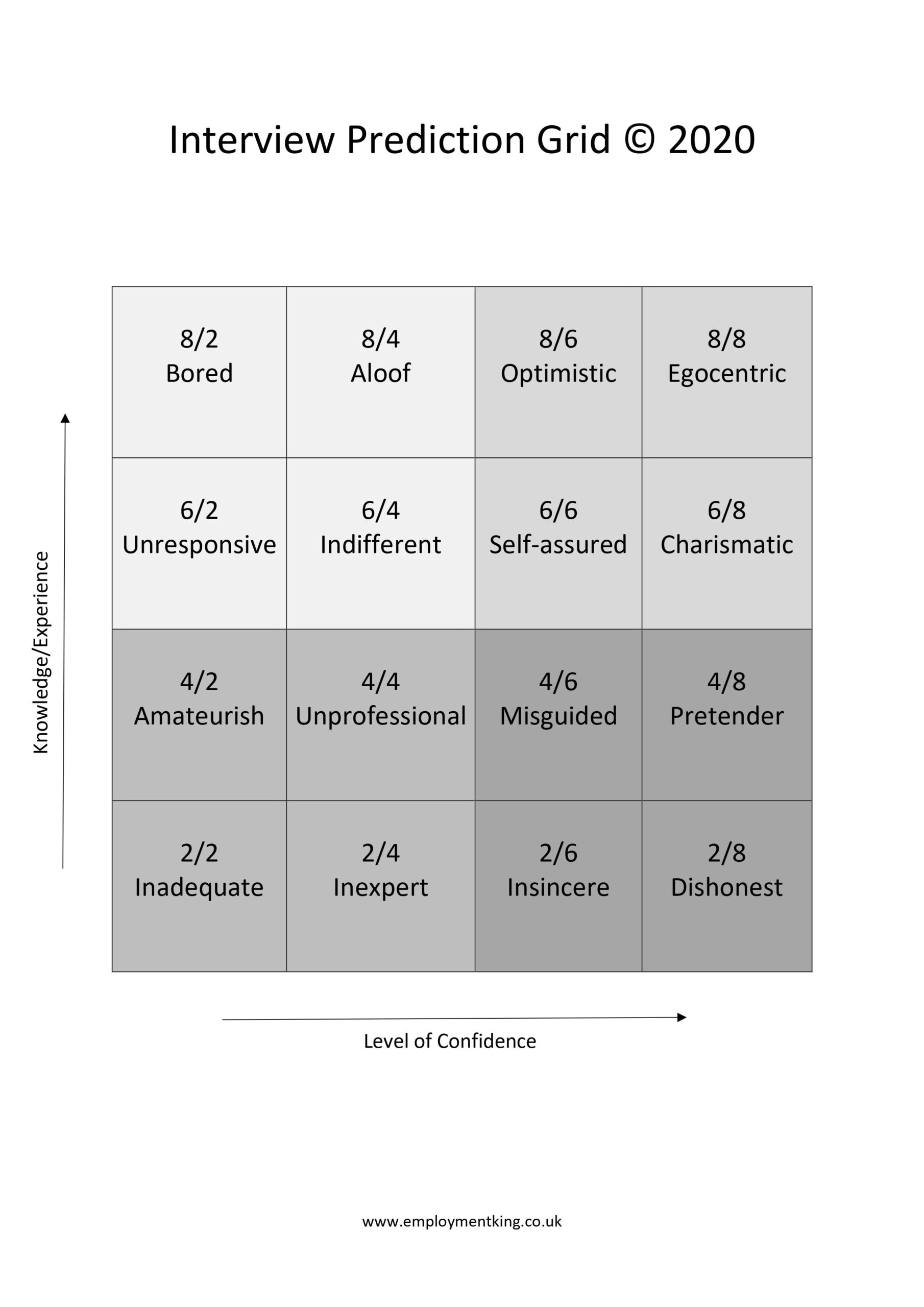Congratulations on completing the Interview Prediction Grid Test (IPG) ©2020.
Below is a breakdown of your Interview Identity
6/2 – Unresponsive

The lack of confidence of 6/2 – Unresponsive interviewees outweighs their medium level of knowledge/experience, leading to short snappy answers that lack detail.
Some employers will encourage the interviewee throughout the question and answer process. Even hinting that they require more information, but the anxiety of a job interview can result in a poor performance that will make the interviewer remember the applicants for the wrong reasons, “We gave them every chance to answer the interview questions.”
Many interviewers will create a bias at the interview start based on the candidate’s obvious nervousness that will influence the hiring decision. It is the 6/2 – Unresponsive interviewees’ consistent lack of good answers that results in regular job rejections.
Against other highly confident applicants, 6/2 – Unresponsive interviewees will often fail unless they possess a unique desirable skill that they can express during the job interview. It is the lack of confidence that results in the 6/2 – Unresponsive sometimes working in positions below their level of knowledge/experience.
Strengths
Possessing at least a degree-level qualification and/or having worked in the sector for a high number of years, often in different roles gaining a diverse skill set, the highly accomplished applicant will easily meet the required criteria for medium-skilled positions.
With a working knowledge of sector theories and models, plus, in many instances, actual experience of implementing processes into business as usual tasks, the 6/2 – Unresponsive applicant can be highly suitable for the advertised role. In addition, some highly skilled and experienced applicants can show their competencies by sharing examples of how they handled situations that could have resulted negatively for an organisation.
When feeling confident, which is rare, or when a question relates to a subject they are passionate about, this wealth of experience can be expressed through detailed examples.
The expertise gained through many years working within the sector often results in applicants applying for managerial or specialist roles – a position they should excel in.
Development
A career professional with a low level of confidence will often suffer from imposter syndrome. A lack of self-belief and self-worth is the applicant’s biggest barrier. A negative opinion of self comes across in the weak answers given to technical questions. Not only does a weak answer minimise the perceived level of knowledge and experience, it also reduces likeability.
Even with evidence: the duration in a job sector, possessing a higher education qualification and/or industry-related successes, 6/2 – Unresponsive candidates feel inadequate for the role they are applying for. This results in a lack of self-promotion.
Imposter syndrome is a belief. Beliefs can be challenged. Challenging a belief creates change. It is the negative generalisations that applicants tell themselves which build upon their limiting belief. By picking holes in the generalisation, the belief can be removed. An example of this would be an applicant asking, “What does good enough mean?” to the limiting belief, “I’m not good enough.” Or, “What skill do I excel in?” to the belief, “Everyone is better than me.”
Self-deprecation will evolve into self-esteem when applicants become aware of and believe in their skill set. Collating evidence can be completed through a self-evaluation, 360-degree feedback, appraisals, and the reviewing of successful projects. Positive common themes, gained from various sources, become the new frame of reference.

Advice for the job interview
- Drink water between interview questions to stop the negative effects of a dry mouth. The duration of the water intake can be used to think of details for the forthcoming answer
- When answering questions, imagine telling a story – a story requires a beginning, middle and end, which results in a higher word per answer ratio, helping to naturally discuss the job criteria
- Purposely use varied language, singular and plural pronouns, power words and language that elicits a positive emotional response, to increase likeability
Research: IPG






